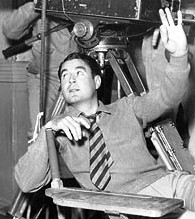Leo McCarey
| Leo McCarey | |
|---|---|

on the set of Make Way for Tomorrow (1937)
|
|
| Born |
Thomas Leo McCarey October 3, 1898 Los Angeles, California, U.S. |
| Died | July 5, 1969 (aged 70) Santa Monica, California, U.S. |
| Spouse(s) | Stella Martin (1920–1969) |
Thomas Leo McCarey (October 3, 1898 – July 5, 1969) was a three-time Academy Award winning American film director, screenwriter and producer. He was involved in nearly 200 movies, the most well known today being Duck Soup, Make Way for Tomorrow, The Awful Truth, Going My Way and An Affair To Remember.
While focusing mainly on screwball comedies during the 1930s, McCarey turned towards producing more socially conscious and overtly religious movies during the 1940s, ultimately finding success and acclaim in both genres. McCarey was one of the most popular and established comedy directors of the pre-World War II era.
Born in Los Angeles, California, McCarey attended St. Joseph’s Catholic school and Los Angeles High School. His father was Thomas J. McCarey, whom the Los Angeles Times called "the greatest fight promoter in the world". Leo McCarey would later make a boxing comedy with Harold Lloyd called The Milky Way (1936).
Leo McCarey graduated from the University of Southern California law school and besides the law tried mining, boxing, and songwriting before becoming an assistant director to Tod Browning in 1919. It was McCarey's boyhood friend, the actor and future fellow director David Butler, who referred him to Browning. Browning convinced McCarey, despite his photogenic looks, to work on the creative side as a writer rather than as an actor. McCarey then honed his skills at the Hal Roach Studios. Roach had hired him as a gagman in 1923, after McCarey had impressed him with his sense of humor, following a game of handball together at a sports club. McCarey initially wrote gags for the Our Gang series and other studio stars, then produced and directed shorts, including two-reelers with Charley Chase. Chase would in fact become McCarey's mentor. Upon the comedian's death in 1940, McCarey was quoted as saying, "Whatever success I have had or may have, I owe to his help because he taught me all I know." The two men were especially compatible, as they both enjoyed a hobby on the side trying to write popular songs. While at Roach, McCarey, according to later interviews, cast Stan Laurel and Oliver Hardy together and guided development of their onscreen characters, thus creating one of the most enduring comedy teams of all time. He only officially appeared as director of the duo's shorts We Faw Down (1928), Liberty (1929) and Wrong Again (1929), but wrote many screenplays and supervised the direction by others. By 1929, he was vice-president of production for the studio. Less well known from this period are the shorts he directed with Max Davidson when Roach put together the Irish-American McCarey with the Jewish-American actor for a series of "dialect comedies." These shorts such as Pass The Gravy have been rediscovered in recent years, after their exhibition in 1994 at the Giornate del Cinema Muto in Pordenone Italy. Pass The Gravy was added to the National Film Registry at the Library of Congress in 1999.
...
Wikipedia
